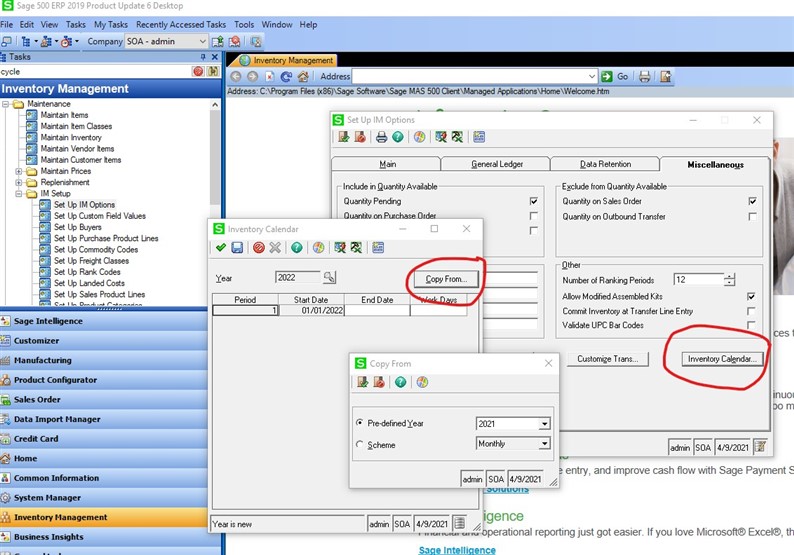The new year 2022 is coming and that also means that you need to have year 2022 created in your Sage 500 inventory calendar. The Inventory Calendar must be set up before posting transactions to the year 2022. Since there is no direct task on the Sage 500 desktop the Inventory Calendar may be hard to find.
The inventory calendar starts on 01/01 and ends on 12/31; however, you can break this down over multiple periods and not necessarily over 12. The last date of the last period must end on 12/31. The number of working days entered automatically defaults to the number of days in the period; however, you can modify this to accommodate holidays and weekends. The number of working days entered is used when calculating the daily demand for an item based on the current inventory period.
Here are the steps to create a new inventory calendar year:
- Open Inventory Management, Maintenance, IM Setup, Set up IM Options.
- Click on the Miscellaneous tab, and then click the button Inventory Calendar...
- To create a new year, click the Cancel icon to clear the grid of the current year, and type the new year in the Year field.
- For a quick setup, you may choose Copy From... button to use the same Start Date and End Date of the previous year, or Monthly option to fill the period start and end dates in the new year.
- You may modify any of the dates in the period but the Inventory Calendar must follow a calendar year where the 1st period start date must be 01/01/YYYY and the end date in the last period must be 12/31/YYYY.
- Click the Save icon.
- Click Yes to the message: "Inventory history will be recalculated. Do you want to proceed?"
- The inventory calendar is now created successfully.

Also, when saving a new year or editing an existing year in the inventory calendar the system prompts an inventory history recalculation. This process will insert new rows in inventory history tables with new dates and correct corresponding beginning inventory balances. Inventory periods are based on a calendar year but do not have to correspond to months. In some instances it may take several hours to create a new inventory calendar year depending on the number of years of retained history, the transaction volume and the optimization of the SQL Server. The process may be ran in a test environment first to approximately determine how long it will take to run this in production database.

